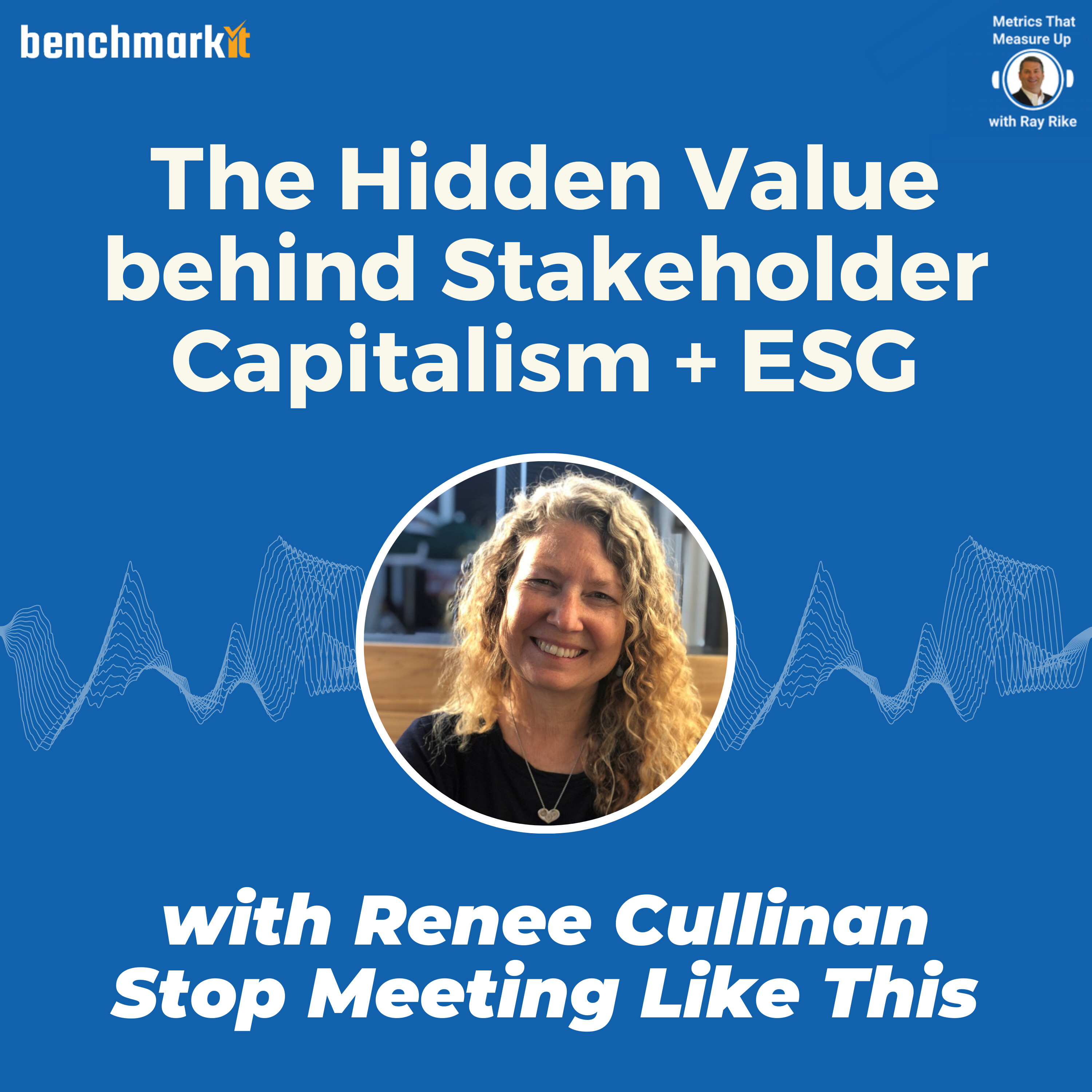
Stakeholder Capitalism + ESG - Uncovering Hidden Enterprise Value with Renee Cullinan
 2021-07-20
2021-07-20
Renee Cullinan, founder of "Stop Meeting Like This" is pivoting her highly successful career as a high tech executive and then founder of a pioneering consulting company that focused on how to increased company productivity and employee satisfaction by eliminating the wasted time associated with internal meetings and email overload.
In this episode of Metrics that Measure Up, we focus on both the metrics associated with increased employee productivity and then on the increasing importance of understanding and enhancing stakeholder satisfaction.
White-collar employees, especially senior executives spend most of their time in meetings and composing and responding to emails. Using a typical executive, they spend approximately 25 hours per week in meetings, which equates to 1,200 hours per year, and on average, 32% of that time is wasted. Think how much more productive you can be with having an extra 400 hours (10 weeks) to invest in higher value, strategic activities?
Unfortunately, not enough companies tackle this productivity opportunity, often because of the inherent challenge of the existing culture of a company. Fixing this requires consistent, ongoing executive commitment which means having a long-term employee productivity orientation. Biopharma companies lead the way in being willing to take on this opportunity, due to their historical long-term orientation.
In the "very interesting" category, Renee actually found the work from home environment during the pandemic, actually helped to increase the productivity of meetings and the
Renee shares 5 questions to determine if your organization is positioned to capture this hidden productivity drain:
Are you a manager or maker?
How many hours are you in meetings per week?
Which of the following statements is more true?
- I control my calendar or my calendar controls me
Given my role, the # of meetings I am in is?
- too many
- just right
- too few
What percentage of total meeting time is wasted?
- late starts
- late arrivals requiring repeating conversations
- technology snafus
Next, we pivoted to Stakeholder capitalism and Environmental, Social, and Corporate Governance (ESG). My first question was if only 50% of companies are willing to invest in tackling internal employee productivity, how willing are they to take on ESG. Renee highlighted that internal productivity and employee satisfaction are too often a "HR" initiative and thus are often dead on arrival.
In contrast, ESG is driven primarily by external constituents, by regulatory bodies like the SEC, and potential customers, especially in the Fortune 500 are now requiring ESG responses within vendor RFPs and many board of directors are linking executive compensation to ESG metrics and measurements.
Socially responsible investing is also increasing measured by shareholder investment decisions, in fact, the percentage of US-based assets under management that use ESG criteria to make investments increased by 42% over the last two years.
I asked Renee if small, high-growth B2B SaaS companies can justify investing in ESG initiatives. The response, if you are selling to Enterprise-class companies, ESG leadership will be a competitive advantage in acquiring new customers AND socially conscious employees.
Renee's example of the social impact of "free meals" at high tech companies and its impact on local businesses and the local community are not understood, or at least not prioritized.
If ESG and stakeholder capitalism + increasing employee productivity are topics you are interested in promoting within your company, Renee is a great listen!
See Privacy Policy at https://art19.com/privacy and California Privacy Notice at https://art19.com/privacy#do-not-sell-my-info.
More Episodes
Create your
podcast in
minutes
- Full-featured podcast site
- Unlimited storage and bandwidth
- Comprehensive podcast stats
- Distribute to Apple Podcasts, Spotify, and more
- Make money with your podcast
It is Free
- Privacy Policy
- Cookie Policy
- Terms of Use
- Consent Preferences
- Copyright © 2015-2024 Podbean.com






